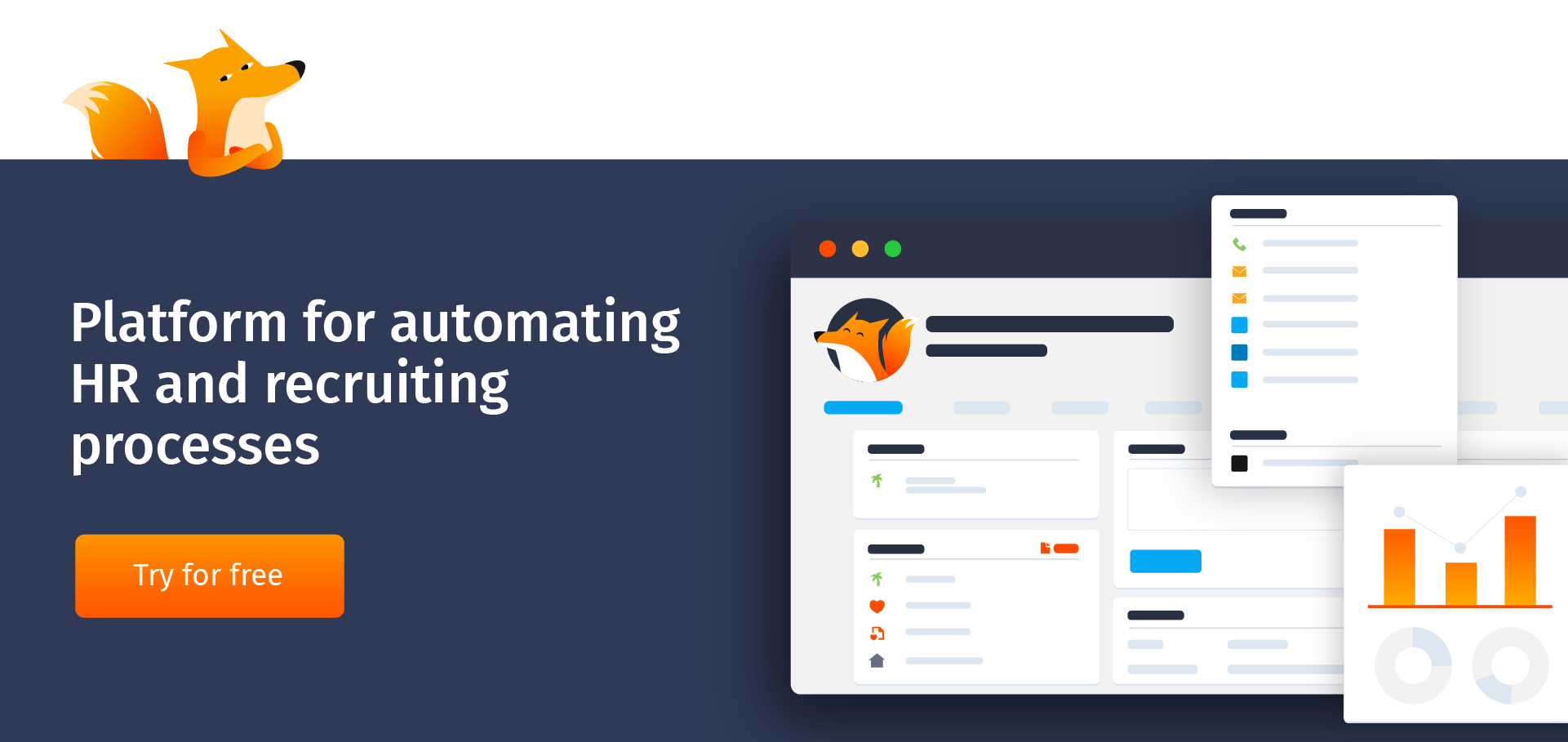Subscribe to the newsletter of articles for HR and recruiters! Be on trend with Hurma ;)
I consent to the processing and use of my personal data in accordance with the Privacy Policy and accept Terms of Service
The HR Director (HRD) is one of the key figures in any company. The work of the whole team depends on his professionalism. HR Director attracts new employees, engages in staff retention and forms the personnel reserve. Development of personnel policy, motivation and training lie on his shoulders. In this article, we will understand the duties and tasks of a HR Director and tell you how to become one.
The Human Resources Director manages the tasks in the field of human resources management, which ensures a team-oriented atmosphere. Special attention should be paid to employee empowerment, quality of work, productivity, achievement of goals, training human resources and continuous employees’ development.
So, let's see what the HR Director does.
The HR Director manages the recruitment, so he’s doing the following:

Within the framework of responsibilities of HR department management, HR-director performs the following tasks:
HR Director creates training programs, and delegates responsibilities within these programs:
The HR Director formulates the company policy regarding relations with employees:
The number of duties and areas of responsibility of the HR Director determines the requirements of the job description.
HRD has to be highly-qualified and able to multitask. Let's find out what knowledge and skills are necessary for efficient work.
A Human Resources manager shouldn’t necessarily deeply understand the company's product specifics. For example, if the company produces dairy products, HR Director shouldn’t distinguish all the types of products. His task is to find a person who understands this.
Of course, the perfect HRD at least used to work in a related field. But the number of personnel, departments and branches is more important.
A good HR director is a person who knows how to optimize internal processes in the company. He or she can have both humanitarian and technical education. An applicant who has studied in a close specialty has advantages, but his personal and organizational qualities might be a decisive factor.
Professional qualities depend on experience and education. But many of them are a symbiosis of personal and acquired characteristics.
What kind of professional qualities are needed:
Personal qualities are most important for a manager, especially for those who work with human resources. Communication skills and understanding of psychology are very important. HRD cannot become a professional in this field without these skills.
What personal qualities an HR Director needs? The list is below:
The human resources management system is a set of interrelated elements that work because of correct usage of human resources technologies. The system covers many processes in which employees participate.
The goal of the HR director is to make the system as efficient as possible and correspond the strategic goals of the company.
However, it is necessary to pay attention to the pitfalls that prevent achieving the intended goal:
Each specialist builds his or her work in a way that is familiar to him or her. For example, as he or she did at the previous place of work, or according to information from outside. Only by understanding the peculiarities of corporate culture and other organizational issues of a particular business can we create a system that will work and meet the common goals.
A good HR manager understands which elements can be implemented fast and which are needed to be introduced gradually. HRD shouldn’t hurry introducing new systems or practices. The pace of implementation of some innovations is the most important aspect of work. It is necessary to conduct holistic research, to understand how business works now and build a strategy based on this research.
HRD’s day will be organized differently depending on the company where he or she works. For example, in one organization, the working day for all employees starts at 9:00 a.m., which means that the managers will have a meeting around 9:30 a.m. In another organization, employees come to work between 9:00 a.m. and 11:00 a.m. and they have a meeting time at 12:00 a.m.
Let's look at a small example of the day of the average HR director, who comes to work at 9:15 a.m.
| Task | Time | Duration |
| Managers meeting | 9:15 | 15-20 min |
| Making a plan of vacancies closing | 10:00 | 20-60 min |
| Closing the project. Calculate the sum of bonuses | 11:00 - 13:00 | 30 min - 1.5 h |
| Preparing the report of the HR department’s work during the month | 14:00 | 1.5 h |
| Interview on the “FEA Manager” vacancy | 16:00 - 16:30 | 30 min - 2 h |
The number of HR manager’s tasks for one day depends on his or her efficiency and ability to plan his or her time. Someone can finish their plan by lunchtime, and someone will need to move some issues to the next day.
The human factor is very important too, the new cases might appear during the day and some less significant ones can be delegated.
The learning is not enough to become a leader. You need to work on your skills and, of course, set the right goals. Let's talk about these moments.
The specialty of the head of the human resources department is demanded and prestigious. Where do they study to become such specialists? There are many ways of development for an HR manager:
Many universities have specialties that can be used to start a career as an HR department director. Academic education provides a good basis, but in practice, it is not always applicable. This direction is not sufficiently developed yet, so the information is often disconnected from reality.
In every big city, there is a big number of courses that will help you master the necessary background. They give deeper knowledge, and many participants can find a job at the starting position after these courses. Such training gives a comprehensive vision of the roles and principles of HR work.
This format is suitable for those who already know the basics. It is mainly used to deepen knowledge, broaden outlook, and explore new trends. Speakers share their "cases"and findings that are easy to test in practice.
Online courses can provide a good basis, especially for specialists from small towns, where full-fledged face-to-face training programs are absent. Also, it takes less time because you don’t need to waste time on commuting.
Building a career in HR isn’t more difficult than in other areas. According to American research data, it takes up to 20 years to get from a simple HR to a manager. In today's fast-growing companies, it is possible to take up a managerial position faster because this segment is not sufficiently developed yet.
So, how to get to the top, if you now have a position of a simple HR-manager:
Even if financial issues are not part of your current responsibilities, do not neglect this topic. All senior management positions are related to budgeting. If you want to grow, you should pay special attention to the development of financial thinking.
People should understand that you are really an expert in your field from your behavior, your way of communicating, your arguments. People need to feel that you know what you're talking about.
The top of the career cannot be achieved without personal and professional growth. Of course, it is not easy to fulfill your duties and find strength for additional education, but doubts fall away when you know why you do it.
Go outside the office, office, business sphere. You wouldn’t get an idea of the market situation, trends, or new programs by communicating only with colleagues. Networking is an important part of the top managers’ work, so don’t lose sight of the state of the company’s business and the prospects of the market segment.
The HR Director motivates employees, works to increase engagement and creates a positive internal culture. He/she increases the value of the business in the market because a good leader understands that the main asset of a successful company is a team.
Assessing the strengths and weaknesses of the organization, forecasting opportunities and threats are the parts of strategic planning. This is also a very important aspect of work, allowing the company to develop together with the market.
HRD is a top manager and not only. The work of the HR department depends on him and also the whole company’s work in many aspects. This place should be occupied only by a highly-organized person who is able to be responsible for dozens of processes at once.
Do you agree?

I consent to the processing and use of my personal data in accordance with the Privacy Policy and accept Terms of Service
 How does the Hurma system help save time for the HR manager?
How does the Hurma system help save time for the HR manager?
 Your data is secure: How Hurma System protects the personal details of our customers
Your data is secure: How Hurma System protects the personal details of our customers